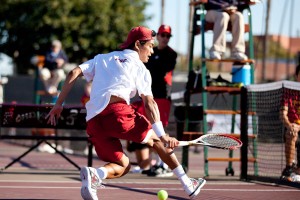Q&A Sarmiento holds court for Trojans
The fourth-ranked USC men’s tennis team had an impressive showing at last weekend’s Pac-12/SEC Showdown, sweeping No. 3 Georgia and No. 11 Florida. Leading the way was the Trojans’ captain and top singles player Ray Sarmiento, who didn’t drop a single set on his way to two singles victories.

Ace in the hole · Captain Ray Sarmiento helped the Trojans win two national championships during his first two years. After faltering in last year’s NCAA quarterfinals, the senior hopes to lead the Trojans back to the top. – Ralf Cheung | Daily Trojan
Daily Trojan managing editor Euno Lee sat down with Sarmiento yesterday to discuss his individual and team successes.
DT: How do you feel about this season and this year’s team?
Sarmiento: We had a great fall to begin with, and I think that set up the good start we had this weekend, but overall I think our team is looking good. We have a really deep team and everyone’s competing for a spot and that brings up the intensity in the practice. Throughout the year I think our goal is to take every day and give it our best. Not really worrying about the results right now, but more toward the end of May.
DT: Coach [Peter Smith] was saying [Sunday] that you made a lot of changes. What are some of those changes to you, and when did this happen?
Sarmiento: That’s a big thing coming from Big Pete [Smith]. I guess it’s a mindset. Since it’s my last year, my mindset’s a little different. I’m taking things more professionally. I try to do my best to lead by example. Stevie [Steve Johnson] and D Nguyen [Daniel Nguyen] were the past leaders and I’ve learned a lot from them, so that’s helped a lot.
DT: How about on the court? You were saying you stay in the points more.
Sarmiento: I think maybe before I was trying to close out the points too early, and trying to finish off the points where I didn’t really have the shot to. Now I’m working the points and developing the points longer and getting that absolute short ball and making it certain that I win the point. That comes from Coach, who stresses that.
DT: What’s the difference between playing aggressive, like you did last year, and this new game?
Sarmiento: I still want to be aggressive and approach the net and hit aggressive shots. I’m still aggressive, but I’m waiting on that short ball instead of hitting the winner when I’m 10 feet behind the baseline.
DT: Are you thinking of playing professionally?
Sarmiento: Yeah, that’s the goal. I want to give it my best and give it a shot. I don’t want to leave anything short, I just want to give it my all this year and the years after this.
DT: You played on NCAA championship teams your freshman and sophomore years. After what happened last year, your junior year [when the Trojans were knocked out during the quarterfinals of the NCAA tournament], what will it mean to go back this year and pull out another NCAA title? Could this championship mean more than the first two?
Sarmiento: That’s a tough one. I guess the last one would be the sweetest. It’s my last year and I want to finish strong. Every single one was special. My freshman and sophomore year, it was an amazing feeling and I definitely want to experience that again.
DT: Last year against UCLA you had [Dennis Novikov] giving you a lot of trouble with big serves. Did you work in the offseason as far as trying to figure out how to even out those big serves that come off the ground?
Sarmiento: It was about reading big serves and adjusting to it. When I played Dennis, I felt like that time I was just standing in the same spot every time. I didn’t adjust accordingly, so that made a big difference. I felt like I was crowding the ball, and I didn’t give enough space so that was the main difference. It’s all about reading the opponent’s serves. I think it all comes instinctively. I definitely work on it in practice, but I don’t want to worry too much about it in matches. It’s more about imposing the strategy of my game than it is positioning.
DT: Going off of that, you know tennis is a game that doesn’t tell you much with just a score. There are always different ways to win a game. For Ray Sarmiento, what is the “best way” to win?
Sarmiento: Definitely developing the points and looking to get in. Moving my opponent around and knocking off that easy volley. Playing efficiently and using my quickness. I try to play fast. Playing heavy is a safer shot … but I try to do a little bit of both.
DT: What do you think is the biggest misconception about college tennis?
Sarmiento: I think for these [junior 18-and-under tennis players] coming up, they think that college tennis isn’t a high level of tennis. They think when they go to college tennis that their aspirations of going pro are down the drain, but I think college tennis is the best way to get to that next level. A lot of these juniors want to just skip a step and go to the next level and they get stuck and they get burnt out easier on tours. It develops you not only as a tennis player, but as a person. You get a great education, and you couldn’t ask for a better way to develop as a person. I feel like I’ve grown so much these past four years, and it’s helped me a lot.

